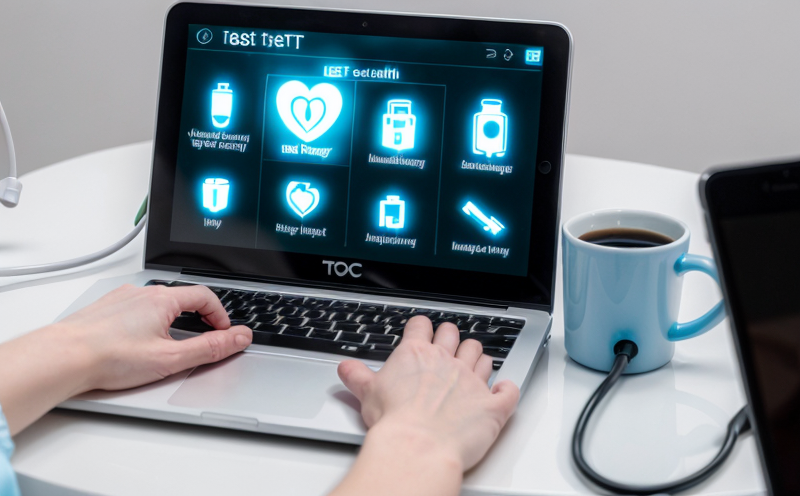ISO 14971 Risk Management Testing for Health IoT Equipment
The International Standard ISO 14971:2016 provides a comprehensive framework for risk management in the design and manufacture of medical devices. This standard ensures that all potential risks are identified, evaluated, and mitigated to ensure safety and efficacy. For health IoT devices, compliance with ISO 14971 is critical as these devices play an increasingly important role in healthcare delivery.
Incorporating risk management into the development process helps manufacturers anticipate and address potential issues before they become safety hazards. The standard covers a wide range of aspects including:
- Identification of risks
- Evaluation of risks
- Mitigation strategies
- Documentation of risk management activities
The process starts with identifying all potential hazards associated with the device. This includes both physical and non-physical aspects such as software malfunctions, connectivity issues, and user interface problems. Once identified, these risks are evaluated based on their severity and likelihood of occurrence. The evaluation helps in prioritizing which risks need to be addressed first.
After identification and evaluation, appropriate mitigation strategies are developed. These may include design modifications, enhanced testing protocols, or additional safety features. It's crucial that the chosen strategy effectively reduces the risk to an acceptable level. Documentation plays a vital role throughout this process; it ensures transparency and traceability of all risk management activities.
Compliance with ISO 14971 is not just about meeting regulatory requirements but also about enhancing product quality, improving patient safety, and gaining market acceptance. By adhering to these standards, manufacturers demonstrate their commitment to excellence in healthcare technology.
| Industry Applications |
|---|
| Smart medical devices such as wearable health monitors, insulin pumps, and home diagnostic tools are prime examples. These devices not only monitor vital signs but also provide actionable insights to healthcare providers and patients. |
| Home health monitoring systems that allow continuous tracking of patient conditions from the comfort of their homes. |
| Telemedicine devices enabling remote consultations between doctors and patients, enhancing accessibility to healthcare services. |
The importance of ISO 14971 cannot be overstated. It ensures that all health IoT devices are rigorously tested for safety and effectiveness before they reach the market. This standard helps in building trust among consumers, clinicians, and regulatory bodies.
At our laboratory, we employ a team of experienced professionals who specialize in ISO 14971 compliance testing for health IoT equipment. Our state-of-the-art facilities are equipped with cutting-edge technology that allows us to conduct comprehensive risk assessments tailored specifically for your device. From initial hazard identification through final documentation review, we ensure every aspect of the standard is adhered to.
Our commitment extends beyond just meeting regulatory requirements; it includes providing valuable insights into how you can further enhance the safety and performance of your product. By working closely with us during the development phase, you can rest assured that your device will not only comply with ISO 14971 but also stand out in a competitive market.
Industry Applications
The applications for ISO 14971 compliance are vast and varied within the healthcare sector. Here are some key areas where this standard is particularly relevant:
- Wearable Health Monitors: These devices continuously track vital signs like heart rate, blood pressure, and oxygen levels.
- Insulin Pumps: Used by diabetic patients to administer insulin automatically or manually as needed.
- Home Diagnostic Tools: Devices that allow users to perform simple tests at home such as blood glucose meters.
- Telemedicine Systems: Platforms facilitating remote consultations between healthcare providers and patients.
In all these applications, the ability of health IoT devices to provide accurate data while ensuring patient safety is paramount. ISO 14971 helps manufacturers achieve this balance by providing a structured approach to risk management.
International Acceptance and Recognition
The International Standard ISO 14971:2016 has gained widespread acceptance across various countries around the world. Here’s an overview of some key regions that recognize this standard:
- Australia – The Australian Therapeutic Goods Administration (TGA) accepts ISO 14971 as part of its regulatory framework.
- Canada – Health Canada considers compliance with ISO 14971 when evaluating medical devices.
- European Union – The European Commission has recognized ISO 14971 as a harmonized standard for risk management in the EU.
- United States – While not mandatory, many American companies voluntarily comply with ISO 14971 to ensure product safety and regulatory compliance.
The broad acceptance of this standard underscores its importance in ensuring high-quality medical devices. By complying with ISO 14971, manufacturers can open doors to international markets while also enhancing their reputation among consumers and healthcare professionals.
Competitive Advantage and Market Impact
Compliance with ISO 14971 offers numerous benefits that translate directly into competitive advantages:
- Enhanced Patient Safety: By identifying and mitigating potential risks, manufacturers can significantly improve the safety profile of their products.
- Improved Product Quality: Rigorous adherence to ISO 14971 helps maintain consistent product quality across different batches and production runs.
- Increased Market Access: Many countries have made compliance with international standards like ISO a requirement for market entry. Meeting these standards can streamline the importation process and expand your customer base.
- Better Regulatory Compliance: Regulatory bodies worldwide increasingly favor companies that demonstrate adherence to recognized international standards.
- Positive Brand Image: A commitment to ISO 14971 reflects positively on a company’s reputation, fostering trust and confidence among stakeholders.
The impact of these advantages is felt not only within the healthcare industry but also extends across related sectors. Consumers increasingly prefer products that come from reputable manufacturers who prioritize safety and quality. This trend further emphasizes the importance of ISO 14971 compliance for any company involved in health IoT device manufacturing.





